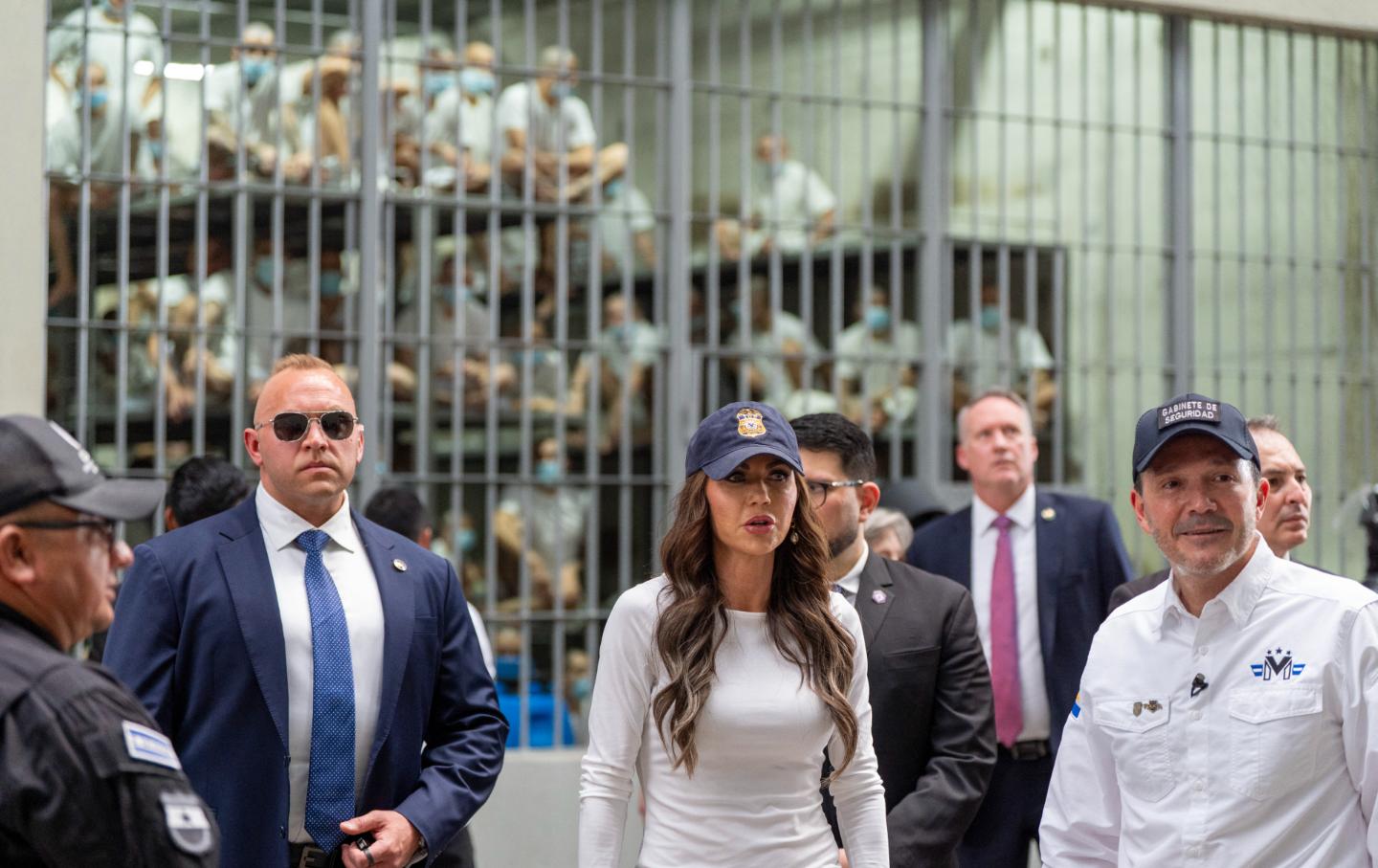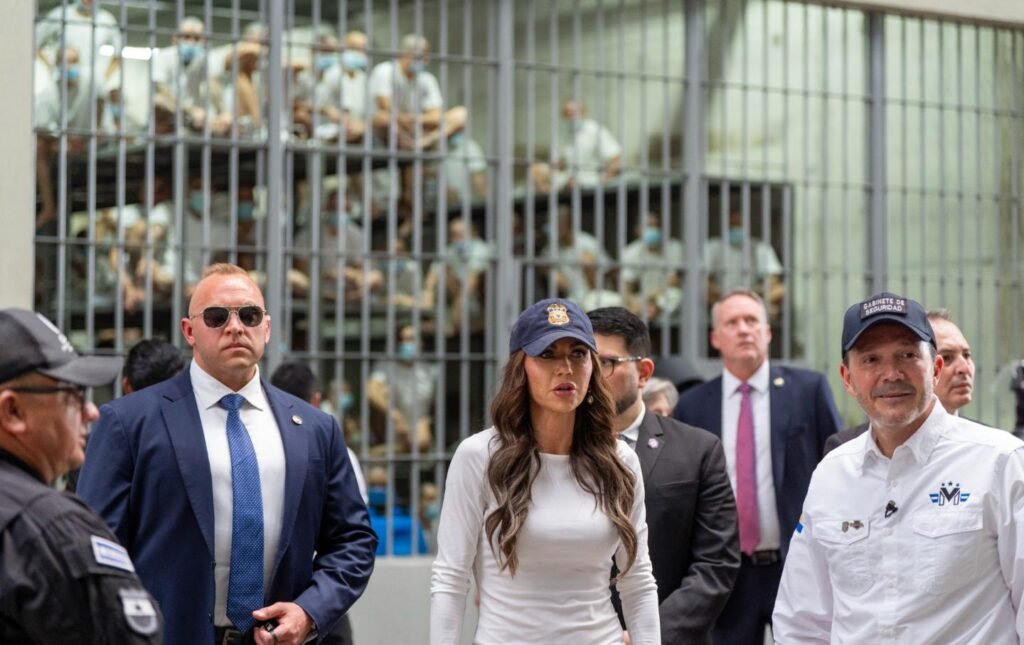The government is enlisting—or coercing—other countries into joining its efforts to purge immigrants from the United States.

US Secretary of Homeland Security Kristi Noem tours the Terrorist Confinement Center (CECOT) in Tecoluca, El Salvador, on March 26, 2025.
(Alex Brandon / Pool / AFP via Getty Images)
Ever since Donald Trump returned to power, people from various countries who, after making likely-harrowing journeys in search of better lives, reached the United States, have found themselves surprised to be apprehended and ejected from the country—not even to their own places of origin but to third countries like Costa Rica, Honduras, and Panama, which had agreed to detain them at the US government’s behest. In the case of Panama, dozens released from detention are now stranded, having never been able to apply for US asylum.
These migrants ran into the latest iterations of a US strategy stretching back decades known as “border externalization.” Broadly speaking, the phrase describes the way American governments enlist other countries into its restrictionist efforts, thus effectively widening its zone of enforcement beyond its demarcated borders.
While both parties have championed border externalization, it seems to be hitting an apex under a second Trump administration whose top anti-immigrant officials—most notably deputy chief of staff Stephen Miller, the leading architect of Trump’s restrictionist agenda—are determined to barrel over anyone who gets in their way, including the US courts and oversight bodies that hampered them during Trump’s first term.
“One of the takeaways that they had from the many, many lawsuits that they faced is that it is easier to just get rid of asylum seekers and send them to those third countries extrajudicially, often in violation of existing law and judicial orders,” said Azadeh Erfani, policy director at the National Immigrant Justice Center. “They’re less focused on trying to strip away the asylum statute via regulation and other means and they’re a lot more focused on essentially externalizing their deportation program and making it other countries’ problem.”
This effort to use geography to evade legal constraints has been most shockingly on display with the administration’s shipping of hundreds of Venezuelan immigrants to the notorious Salvadoran CECOT mega-prison at the invitation of that country’s authoritarian president, Nayib Bukele. The move also highlighted the other major pillar of Trump’s strategy—speed. Trump’s team was clearly going for a gone-in-60-seconds operation, with the president quietly signing an order absurdly invoking the 1798 Alien Enemies Act—intended to apply to literal enemy combatants on US soil—on a Friday night, and the Department of Homeland Security loading up planes the very next day.
By the time the ACLU sought an emergency order blocking the order’s use from DC District Judge James Boasberg, planes were already in the air. Boasberg ordered the craft turned around, and has spent the intervening couple of weeks probing whether the government violated his order by landing the planes in El Salvador and transferring custody to Bukele’s forces, who are being paid to house the supposed gang members—an accusation for which the government has furnished no evidence and against which evidence is mounting—under unclear legal authorities.
In court, Justice Department officials and lawyers have been presenting arguments that are, as New York Times columnist Jamelle Bouie recently put it, anti-constitutional. For instance, they claimed that Boasberg’s order was invalid because it came as the planes were already in international waters—literally an assertion that federal judicial authority to regulate what seemed to be unlawful immigration policies stopped at the border.
Still, at least the administration was forced to trot out this argument publicly. That’s because the ACLU could file suit in a federal court on behalf of then-US-based plaintiffs. The government benefits from far less oversight when it manages to stop people before they even enter US jurisdiction, using third countries as enforcement proxies while keeping its hands clean. In all the talk about the chaos and economic ramifications of Trump’s continued tariff threats against Mexico and Canada, one thing that’s getting lost is that Trump is essentially ordering our two neighbors to prevent humanitarian migrants from reaching the US border and potentially availing themselves of our due process protections.
Trump has made the same demands before, with considerable success. Mexico effectively created its National Guard in 2019 in direct response to Trump’s tariff threats and has since used it largely to intimidate and intercept US-bound migrants—a policy that continued under Joe Biden. As Trump ramped up talk of a trade war, the new Mexican president, Claudia Sheinbaum, reiterated a commitment to deploy 10,000 troops along the border in a show of force. This makes Mexico a heavy participant in both forms of externalization; it’s stopped migrants from reaching the US, and it’s received those bounced back from it in the form of the Remain in Mexico program and Title 42, both of which utilized obscure statutory provisions to punt asylum seekers to Mexico.
Several other countries have also been roped in. Guatemala’s border security units have been directly trained by US CBP for years, while also being credibly accused of extorting migrants; nonetheless, Guatemala ramped up patrols this month in response to US pressure. Along with El Salvador and Honduras, it signed so-called safe third country agreements with the US during Trump’s first term on the farcical premise that these countries had robust enough asylum systems of their own to absorb migrants often fleeing from a neighboring nation. Not every country seems to mind—Buekele in particular appears eager to collaborate—but it’s hard to imagine that the political and economic might of the United States played no role in any of these agreements.
“The pressure on countries south of the United States is something that has been going on under the Biden administration as well. Under the Covid era, it was in terms of access to vaccines, and what really came close to a quid pro quo kind of situation in order to get different nations in Central America to act as CBP’s proxy,” said Erfani, referencing reports that the federal government was dangling stock of newly developed vaccines in tacit exchange for migration control.
The responsibility-evasion tactic doesn’t mean activists and attorneys around the world haven’t pursued some accountability. Remain in Mexico, Title 42, safe third country, and other policies have been directly challenged in US courts. Now, with the CECOT imprisonments, the Trump administration seems to be trying to leapfrog accountability by just not naming any legal authority at all under which it’s able to have a foreign country detain US removals. There’s been some speculation as to whether migrants held there could file something like a constitutional habeas petition, given that they are in effect being held in US custody, or at least custody that the US government is directly paying for. The confusion is part of the point, taking the natural next step of putting the border externalization scheme entirely outside the law.
Popular
“swipe left below to view more authors”Swipe →
While domestic litigators are trying to finagle ways to restore the rights of those deported or expelled under increasingly strained federal powers, others are turning their attention to the foreign governments collaborating with Trump. Among them is the Global Strategic Litigation Council for Refugee Rights, an international consortium of litigators and immigration-focused organizations that has been involved in cases including a high-profile lawsuit against Panama before the Inter-American Commission on Human Rights over that country’s detention of US deportees.
“One argument that we’re making is that Panama is internationally responsible for those violations of the right to seek asylum by the United States under these particular circumstances of a bilateral agreement,” said Ian Kysel, an associate clinical professor at Cornell Law School and founder of the council. But he acknowledged that it’s unlikely that these proceedings are going to result in an order to have these migrants’ rights vindicated. Even if such orders were given, he added, “it’s difficult to imagine at the present moment that the Trump administration would even consider complying with that.” Still, the efforts can both achieve additional clarity and establish an evidentiary record.
As Kysel points out, the exact authorities and terms under which this US-Panama deal is working are still pretty obscure. An international commission or court could at least compel the parties to respond in more detail and help formally determine “this question of whether and to what degree the United States is accountable for the continued violation of the rights of those who have been expelled by these host states.” While the US and its mad king leader—who seems very ambivalent about domestic legal constraints and judges, let alone international ones—might be indifferent to these international bodies, something like the Inter-American Court could still apply diplomatic pressure and impose damages that’ll move the needle for smaller third countries.
If nothing else, these cases help bring what’s happening at least somewhat into the light of day. At base level, the border externalization effort is one to keep all these processes running in the background, away from public view and hidden from anyone who could conceivably engage in oversight. Successive administrations and Trump especially are hoping to avoid questions by having the public, the media, Congress, and the courts never learn about it all.
More from The Nation

The richest man in the world attempted to buy an election in Wisconsin. His effort crashed and burned, establishing a model for the fightback against Trumpism.

Elon Musk is spending tens of millions of dollars to block free and fair elections in the battleground state.


